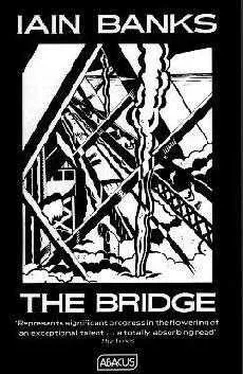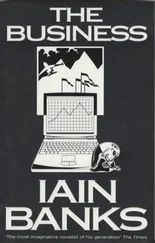'I like this place,' she told him, and she hugged him, her body quivering with the cold. He held her, but looked up into the web of steel overhead, lost in its dark strength.
Three years, he thought. Three years in another city.
'The Tallahatchie Bridge fell down,' he said eventually, more to the cold wind than to her. She looked up at him, nuzzled her cold nose into the presentable remnant of the fine beard he'd grown over the last two years and said,
'What?'
'The Tallahatchie Bridge. Ode to Billy Joe , Bobbie Gentry, remember? The damn thing fell down.' He gave a small, despairing laugh.
'Anybody hurt?' she asked, then put her cold lips on his Adam's Apple.
'I don't know,' he said, suddenly very sad. 'I didn't even think to look. I just saw the headline.'
A train rumbled over the bridge, filling the night air with the bassy voice of other people going to other places. He wondered if any of the passengers would pay heed to the old tradition and throw coins out of their nice warm carriages, spinning futile wishes into the uncaring waters of the cold Firth below.
He didn't tell her, but he remembered being here, in this very spot, years ago, one summer. An uncle who had a car took him and his parents on a ride through the Trossachs and then over to Perth. They came back this way. It was before the road bridge opened in '64 - before they'd even started it, he supposed; it was a Bank Holiday, and there was a queue a mile long waiting for the ferries. The uncle drove them down here instead, to have a look at 'one of Scotland's proudest monuments'.
What age had he been then? He didn't know. Maybe only five or six. His father had held him on his shoulders; he'd touched the cool granite of the piers, and reached, stretching, straining, small hands open and grasping, for the red-painted metal of the bridge ...
The queue of cars had grown no shorter when they went back. They crossed by the Kincardine Bridge instead.
Andrea kissed him, waking him from his memories, and hugged him very tight, tighter than he'd ever have thought she could hug, so tight he almost had difficulty breathing, then she let go, and they went back to the car.
She drove over the road bridge. He looked out over the dark waters to the dim night-shape of the rail bridge they had stood beneath, and saw the long dotted row of lights of a passenger train as it crossed high over the river, heading south. Lights like a row of dots at the end of a sentence, he thought, or at the start of one; three years. Dots like meaningless Morse; a signal made up of only Es and Hs and Is and Ss. The lights flickered through the intervening girders of the bridge; the nearer cables of the road bridge flicked past too quickly to make any difference.
No romance, he thought, watching the train. I remember when there were steam trains. I'd go up to the local station and stand on the foot-bridge over the tracks until a train came along, chuffing steam and smoke. When it went under the wooden bridge its smoke exploded on the metal plates put there to protect the timbers; a sudden blast of smoke and steam which surrounded you for what seemed like very long seconds with a delicious uncertainty, another world of mystery and swirling, half-seen things.
But they closed the line, they dismantled the engines, they tore down the foot-bridge and turned the station into an attractive, very unique and spacious residence with a pleasant southerly aspect and extensive grounds. Very unique. That just about said it all. Even if they'd got it right they'd still have been wrong.
The train flowed across the long viaduct and disappeared into the land. Just like that. No romance. No fireworks as the ashes and cinders were dumped, no flying comet-tail of orange sparks from the chimney, not even any clouds of steam (he would try to write a poem about it the next day, but it wouldn't work and he would throw it away).
He turned from the bridge, yawning as Andrea slowed the car for the tolls. 'You know how long it takes them to paint it, don't you?' he said to her. She shook her head, wound the window down as they came up to the toll plaza.
'What, the railway bridge?' she said digging in a pocket for the money. 'I don't know. A year?'
'Wrong,' he told her, folding his arms, looking ahead towards the red light at the far end of the booth. 'Three. Three fucking years.'
She said nothing. She paid the toll and the light turned green.
He worked, he got on. His mum and dad were proud of him. He got a mortgage on a small flat, still in Canonnrills. The company he worked for let him put some money towards his company car, once he'd ascended to such heights of bourgeois decadence, so he had a bigger and better BMW, rather than a Cortina. Andrea wrote him letters; he would make the same old joke whenever he referred to them.
John Peel played reggae on night-time Radio One. He bought Past, Present and Future by Al Stewart. 'Post World War Two Blues' very nearly made him cry, 'Roads to Moscow' actually did once, and 'Nostradamus' annoyed him. He played The Confessions of Doctor Dream a lot, lying with the headphones on, spreadeagled on the floor in the darkness, smashed out of his skull and humming along with the music. The first track on the eponymous second side was called Irreversible Neural Damage .
Things had a certain pattern, he observed to Stewart Mackie. Stewart and Shona moved to Dunfermline, across the river in Fife. Shona, having been trained to be a PE teacher in the Dunfermline College of Physical Education {located confusingly but cannily not in Dunfermline but across the river near Edinburgh); it seemed then singularly appropriate that she should become a teacher in Dunfermline itself; from one dispossesed capital to another. Stewart was still at the university, finishing post-grad work and probably all set to become a lecturer. He and Shona called their first child after him. It meant more to him than he could tell them.
He travelled. Round Europe on a rail-pass before he got too old, across Canada and America by train, too, and by hitch-hiking and buses and trains down to Morocco and back. That trip he didn't enjoy; he was only twenty-five, but he felt old already. He had the beginnings of a bald patch. Still, there was a wonderful train journey towards the end of it, travelling for some twenty-four hours through Spain, from Algeciras to Irun with some American guys who had some of the finest dope he'd ever encountered. He'd watched the sun come up over the plains of Mancha, listening to the tram's steel wheels playing symphonies.
He always found excuses not to visit Paris. He didn't want to see her there. She came back every now and again; changed, different, somehow more steady and ironic and even more sure of herself. Her hair was short now; very chic, he supposed. They had holidays on the west coast and the islands - when he could get the extra time off - and once went to the Soviet Union; his first trip, her third. He remembered the trains and the journeys on them, of course, but also the people, the architecture and the war memorials. It wasn't the same, though. He was frustrated, unable to speak more than a few words of the language, and listening to her chattering away quite happily with people made him feel he'd lost her to a language (and to a foreign tongue, he thought bitterly; he knew there was someone else in Paris).
He worked on refineries and rig design and made money; he sent some home to his mum now that his dad was retired. He bought a Mercedes and changed it soon afterwards for an old Ferrari which kept fouling its plugs. He settled for a three-year-old red Porsche, though really he wanted a new one.
He started seeing a girl called Nicola, a nurse he'd known since he'd had his appendix out at the Royal Infirmary. People made jokes about their names, called them imperialists, asked them when they were going to claim Russia back. She was small and blonde and had a generous, allowing body; she disapproved of him smoking dope and told him - when he splashed out and bought some coke - that he was insane to waste that sort of money stuffing it up his nose. He felt very tender towards her, he told her once, when he suspected he was supposed to tell her he loved her. I feel tender every bloody morning, you animal, she said, laughing and snuggling up to him. He laughed too, but realised it was the only joke she had ever made. She knew about Andrea but didn't talk about it. They drifted apart after six months. After that, when asked, he said he was playing the field.
Читать дальше












